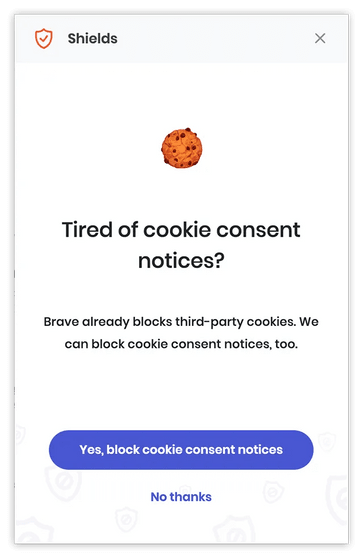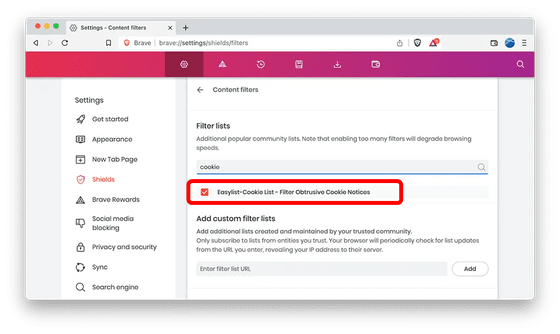Brave Starts Blocking Annoying 'Please Allow Cookies'

While using the Internet, there should be many people who have seen a pop-up saying 'Please allow cookies' or selected the type of cookie to allow. Such indications are necessary to comply with regulations such as the GDPR, but can be annoying for those who do not intend or are not interested in allowing the use of cookies. Brave, a browser with ad- and tracking-blocking features, has started blocking banners prompting you to accept this cookie.
Blocking annoying and privacy-harming cookie consent banners | Brave Browser
Brave updated its official blog on September 28, 2022, announcing that cookie permission notifications will be blocked from version 1.45 of the Brave browser, which will be released in October. This feature will first appear on Brave for PC and Android, and will soon be available for iOS as well. This feature has already been implemented in Brave Nightly, which is a test version for developers.
According to Brave, the cookie permission system is not only annoying but also tracks users, causing privacy violation problems caused by cookies that this system was supposed to prevent. The blocking feature announced today will hide cookie permission notifications and block them where possible.
Brave said, ``Unlike similar features used in other browsers, Brave is more privacy-protective,'' Brave's new feature simply automatically agrees to cookies. Instead, it is a feature that blocks communication between browsers and consent tracking systems.
When a new feature is released, the first time you launch Brave, you will see a dialog like the one below, asking if you want to block the cookie permission notification. If you choose to block here, Brave will download the rules required to block cookie permission notifications and activate the rules within a minute.

If you choose not to block by mistake or want to unblock later, go to 'brave://settings/shields/filters' to open the settings screen and select 'EasyList -Cookie List' setting is OK.

Brave points out that Google is trying to make it harder to eliminate ads and tracking, including blocking cookie banners. Specifically, WebBundles , which allows sites to easily bypass content blockers, Manifest V3 , which greatly limits extension functions, and Privacy Sandbox , which weakens user control and strengthens site control. Applicable.
Regarding these trends, Brave said, ``The web is made to be open. The cookie banner, on the other hand, highlights how a bad place the web can be if Google and others succeed in weakening users' ability to block nuisance.' said.
Related Posts:
in Software, Posted by log1l_ks





